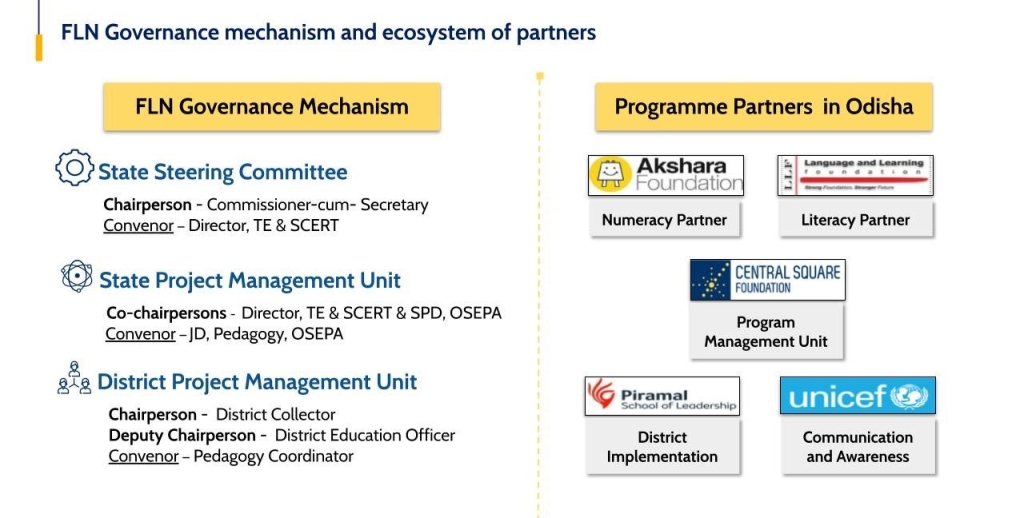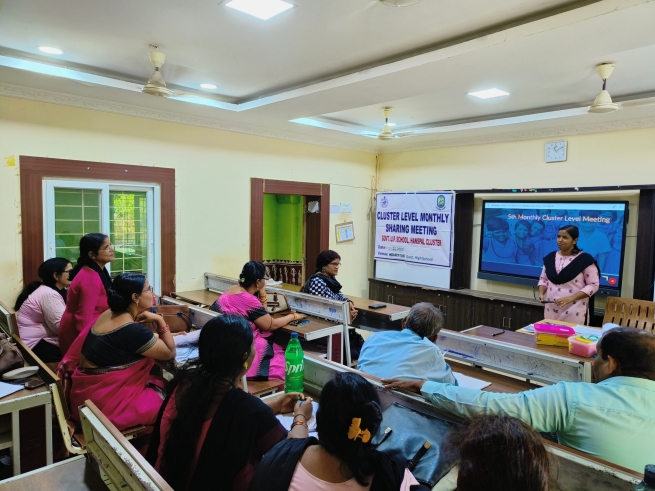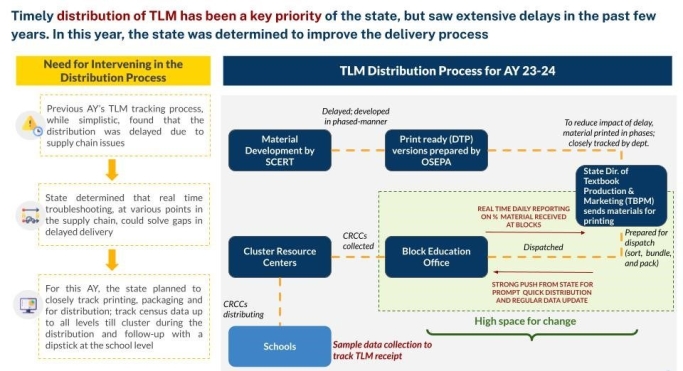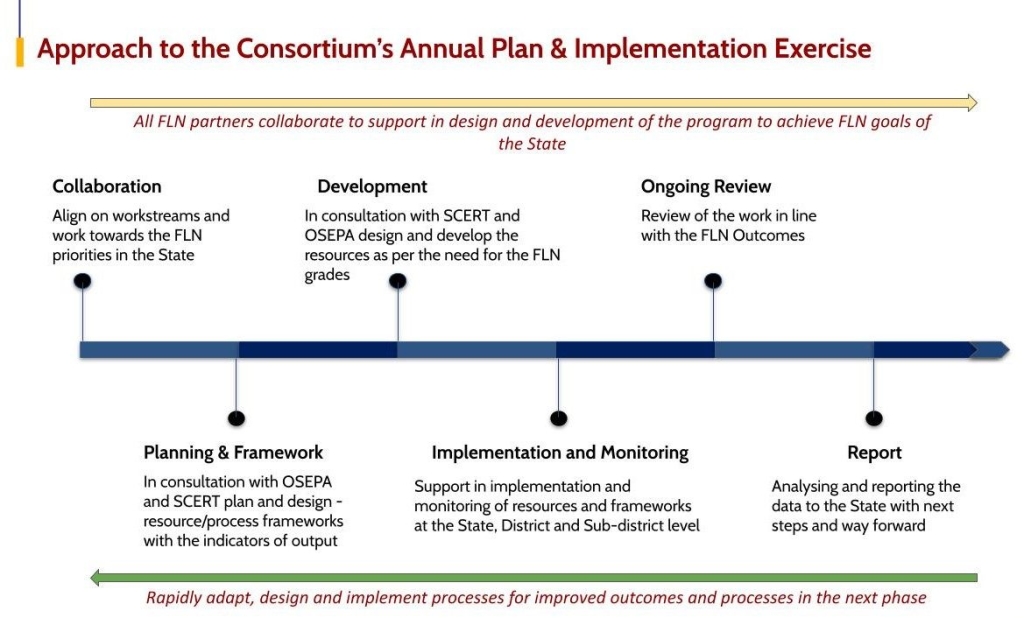Background
In Odisha, statistics from NAS 2017 and ASER 2018 shed light on significant learning disparities among Grade 3 students, With a staggering 69% of children not able to perform basic Math operations and 61% of children were unable to read Grade 2 text in rural areas. Recognising this need for addressing this learning deficit, Odisha launched the Learning Enhancement Programme (LEP) in 2018, aimed at equipping students with foundational competencies before advancing to grade-level skills. Through initiatives like Ujjwal, Utthan, and Utkarsh, students from grades 1-9 were taught at the learner level, bridging the gap between comprehension and grade level. In 2019, a dedicated programme for grades 1-3 on Foundational Literacy and Numeracy (FLN) was proposed, aligning with state learning outcomes and syllabi to address critical learning gaps at the grassroots level.
FLN-focussed Initiatives
In 2021, Odisha made significant strides in advancing its foundational learning initiatives, demonstrating a strong commitment to improving foundational education outcomes across the state. The constitution of the FLN State Steering Committee (SSC) and State Project Management Unit (SPMU) reflects a dedicated effort towards effective governance and oversight of the FLN programme. Furthermore, the setting up of FLN-specific District Project Management Units (DPMUs) in all 30 districts underscores a decentralised approach to programme management and implementation. SCERT’s presentation of the state’s five-year perspective plan to the Ministry of Education in October 2021 highlights Odisha’s commitment to long-term strategic planning and collaboration at the national level to drive meaningful improvements in foundational learning outcomes.
With support from leading educational NGOs, the State education department has been able to prioritise FLN in the state.

Continuing this momentum, Odisha initiated several key initiatives in 2022 aimed at equipping teachers and master trainers to further enhance foundational learning outcomes. A comprehensive teacher training module focusing on the effective transaction of Teaching Learning Materials (TLM) was developed by State Council of Education Research and Training (SCERT) to equip educators with essential skills and strategies. Additionally, a cascaded training plan was meticulously prepared to provide training to District Institutes of Education and Training (DIETs), and subsequently State Resource Groups and Cluster Resource Coordinators (CRCCS), ensuring sharing of best practices in foundational learning.
In order to ensure a smooth transition of Grade 1 students into formal education, SCERT introduced a School Preparedness Module (Vidya Pravesh), while a comprehensive baseline assessment evaluated students’ current learning levels. Furthermore, a Foundational Learning Study conducted in 2022 for Grade 3 students identified areas for improvement and intervention. The emphasis on mentorship and support, along with up-to-date reporting and compliance mechanisms, underscores Odisha’s dedication to fostering improved foundational learning outcomes and ensuring equitable access to quality education for all students.
2023: A Year of Streamlining Initiatives
In the academic year (AY) 2023-24, Odisha embarked on a series of initiatives to bolster foundational learning across the state. Following the finalisation of TLM, a three-day teacher training session was scheduled by the Samagra Shiksha Office (OSEPA), targeting DIET faculties and subsequently Cluster Resource Centre Coordinators (CRCCs) responsible for teacher training. Concurrently, data analysis of a statewide baseline study for Grades 1 and 2 was conducted to inform strategic interventions.
Following a comprehensive state-level review meeting, led by the Commissioner-cum-Secretary, Odisha implemented Monthly Sharing Meetings (MSM) for teachers at the cluster level, a pivotal initiative aimed at enhancing foundational learning practices. Attended by Headmasters (HMs), these gatherings serve as a platform for DIETs to receive orientation from SCERT and subsequently cascade training to CRCCs and HMs. Held on every third Saturday of the month since July 2023, these meetings are meticulously monitored by both state and district officials. Over the past eight months, the monthly cluster meetings have emerged as a vital forum for bolstering FLN practices, offering continuous insights and content inputs from SCERT. With a primary focus on empowering teachers with FLN skills, these sessions delve into various aspects such as FLN concepts, utilisation of FLN-related TLM, live demonstrations and refining classroom instruction techniques.

Timely distribution of TLM has been a key priority of the state but encountered extensive delays in the past few years. In this year, the state was determined to improve the delivery process. The CSF-PMU supported the Odisha School Education Program Authority (OSEPA) to identify lapses in material distribution and actively resolve issues in the supply chain. The Commissioner-cum-Secretary was the champion stakeholder, who tracked distribution on a daily basis.

Over time, a framework has been established through state-level meetings and periodic engagements, facilitating involvement of nodals. This approach has enabled alignment and streamlining of responsibilities, ensuring effective coordination and progress tracking of work done.
Annual Plan – Progress Tracking to Build Salience across all Levels
The annual plan is a cornerstone for tracking progress and ensuring alignment across all levels of the FLN programme in the state. Collaboratively developed by the PMU and FLN partners in the past academic year, it outlines a systematic approach to achieving state FLN goals.
Beginning with collaboration, stakeholders align on workstreams and prioritise FLN initiatives. Planning and framework involve consultation with OSEPA and SCERT to design resource frameworks with key output indicators.
In the development phase, resources are tailored to FLN grade needs. Aspects of implementation and monitoring provide support in implementing and monitoring resources at various administrative levels, followed by review, which ensures continuous progress evaluation against FLN outcomes.
Finally, analysis and reporting goes through data to inform future steps. Through this iterative approach, the programme aims to rapidly adapt processes for continuous improvement and enhanced outcomes in the upcoming phases.

Monitoring and Evidence-based Decision Making
In Odisha, monitoring plays a pivotal role in ensuring the effectiveness of the FLN programme. As part of the State’s approach last year, monitoring protocols, tools, and training of officials were streamlined to align with FLN objectives. Throughout the academic year, district and block officials, along with consortium partners, actively participated in monitoring activities, including dipstick visits to gather qualitative insights from the field. Monthly Cluster Level Meeting summary report and district-wise reports generated by the PMU are then submitted to key stakeholders to inform decision making and problem solving within the School and Mass Education Department. These meetings, held at the cluster level, serve as dynamic platforms for teacher training and knowledge exchange, with school venues rotated within the cluster to facilitate broader participation.
Similarly, reports on DIET/Cluster Resource Centre Coordinators (CRCC) classroom visits, consortium progress and teacher training were generated and submitted for facilitating data-backed decision making. The continuous refinement of tools and facilitation approaches underscores Odisha’s commitment to leveraging evidence for impactful FLN implementation and improvement of classroom practices.
Strengthening Implementation and Way Forward
As the School and Mass Education Department intensifies its implementation efforts, the launch of the monthly cluster level meeting marks a significant stride towards enhancing classroom practices and ensuring timely availability of TLM at the school level. This holistic approach is integrated across all workstreams and consortium activities, reflecting a commitment to comprehensive FLN programme execution.
Illustrating this integrated approach, mentoring emerges as a crucial workstream. In the initial quarter of the academic year, revisions to the classroom observation tool were initiated, piloted among mentors and refined based on feedback. Continuous engagement, including monthly and quarterly analyses, shadow visits and dialogue with mentors, ensures ongoing improvement and alignment with programme objectives.
District-level programmes prioritise implementation effectiveness, with field visits and evidence-based discussions driving programme adaptation across diverse aspects. To maximise the utility of monitoring data, the PMU and partners conduct observations and monitoring processes, evolving to include school-level implementation assessments.
Going forward, the programme aims to further streamline processes and outputs based on field insights, fostering a planning and monitoring system that facilitates cross-location comparisons and aligns with programme goals. This commitment to staying attuned to ground realities ensures interventions remain responsive to evolving needs, underlining a steadfast dedication to advancing foundational learning outcomes.



